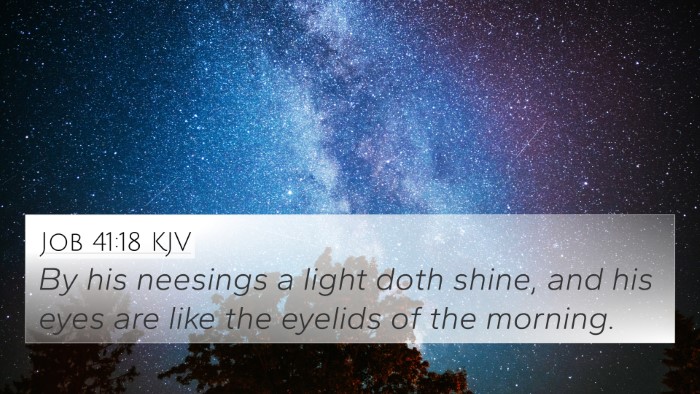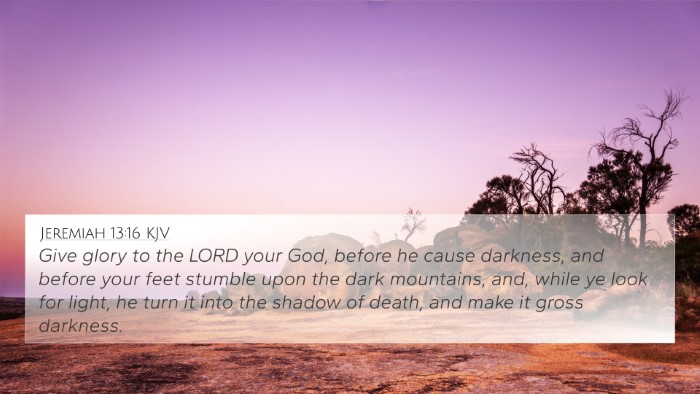Old Testament
Genesis Exodus Leviticus Numbers Deuteronomy Joshua Judges Ruth 1 Samuel 2 Samuel 1 Kings 2 Kings 1 Chronicles 2 Chronicles Ezra Nehemiah Esther Job Psalms Proverbs Ecclesiastes Song of Solomon Isaiah Jeremiah Lamentations Ezekiel Daniel Hosea Joel Amos Obadiah Jonah Micah Nahum Habakkuk Zephaniah Haggai Zechariah MalachiJob 3:9 Similar Verses
Job 3:9 Cross References
Let the stars of the twilight thereof be dark; let it look for light, but have none; neither let it see the dawning of the day:
Uncover the Rich Themes and Topics of This Bible Verse
Listed below are the Bible themes associated with Job 3:9. We invite you to explore each theme to gain deeper insights into the Scriptures.
Job 3:9 Cross Reference Verses
This section features a detailed cross-reference designed to enrich your understanding of the Scriptures. Below, you will find carefully selected verses that echo the themes and teachings related to Job 3:9 KJV. Click on any image to explore detailed analyses of related Bible verses and uncover deeper theological insights.

Job 41:18 (KJV) »
By his neesings a light doth shine, and his eyes are like the eyelids of the morning.

Job 30:26 (KJV) »
When I looked for good, then evil came unto me: and when I waited for light, there came darkness.

Jeremiah 13:16 (KJV) »
Give glory to the LORD your God, before he cause darkness, and before your feet stumble upon the dark mountains, and, while ye look for light, he turn it into the shadow of death, and make it gross darkness.

Jeremiah 8:15 (KJV) »
We looked for peace, but no good came; and for a time of health, and behold trouble!
Job 3:9 Verse Analysis and Similar Verses
Understanding Job 3:9
Job 3:9 presents a moment of profound despair as Job laments his existence and longs for the end of his suffering. The verse reads:
"Let the night be solitary; let no joyful voice come therein."
Verse Contextualization
In this chapter, Job speaks after enduring immense loss and pain. His plight reflects the depth of human suffering and the search for solace. Job's words signify a desire for the night—the metaphorical representation of his dark circumstances—to remain devoid of any cheer or joy. This sentiment highlights the loneliness that accompanies deep despair.
Commentary Insights
-
Matthew Henry's Commentary:
Henry discusses the notion of darkness as a symbol of anguish. He notes that Job's appeal for the night to remain solitary mirrors his overwhelming desire to be free from suffering and that he wishes joy would not intrude upon his sorrow.
-
Albert Barnes' Commentary:
Barnes emphasizes the emotional impact of Job's situation. He observes that Job's wish for no joyful voice reinforces the depth of his pain. This verse represents Job's struggle with despair, illustrating a profound mental turmoil.
-
Adam Clarke's Commentary:
Clarke interprets this plea as an expression of Job's profound grief. He suggests that Job is yearning for solitude in his suffering, feeling that joy would be inappropriate amidst his grief. Clarke further connects this verse to the theme of suffering echoed throughout the Scriptures.
Bible Verse Cross-References
This verse can be cross-referenced with other biblical texts that resonate with themes of darkness, suffering, and solitude:
- Job 10:21-22: Job speaks of his desire to not experience the darkness of death.
- Psalms 88:18: The psalmist expresses a similar sense of being lost to the shadows.
- Ecclesiastes 6:4: Reflects on the futility of life and the weariness of existence, much akin to Job’s sentiments.
- Isaiah 53:3: Foretells a suffering servant, paralleling Job's experience with sorrow and pain.
- Romans 8:18: Paul speaks about present sufferings, aligning with Job's cry for relief.
- Revelation 21:4: Ultimately offers hope of no more pain, contrasting Job’s immediate despair.
- 2 Corinthians 1:3-4: Highlights God as a source of comfort during suffering, which Job yearns for.
Thematic Bible Verse Connections
The themes of isolation and the yearning for relief appear consistently throughout the Bible. Job 3:9 serves as a poignant expression reflecting the depth of human anguish:
- Thematic parallels with Lamentations: The lamentations of the prophet echo the desolation of Job.
- Connections to the Gospels: Jesus’ cry of abandonment on the cross in Mark 15:34 reflects similar feelings of desolate solitude.
- Biblical characters dealing with despair: Elijah in 1 Kings 19:4 and David in Psalms resonate with Job’s pain.
- Comparative studies on suffering: The letters of Paul underscore communal suffering and divine presence in times of trouble (Philippians 3:10).
Conclusion
Job 3:9 encapsulates the struggle with despair and serves as a profound invitation to explore the presence of suffering in spiritual narratives. Connecting this verse with others in the biblical canon reinforces the continuity of themes surrounding grief, isolation, and the longing for hope in the midst of darkness. By utilizing tools for Bible cross-referencing, one can draw deeper insights and engage in a meaningful comparative study of the Scriptures.


